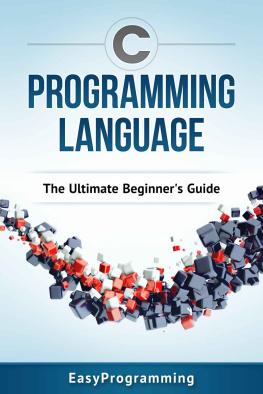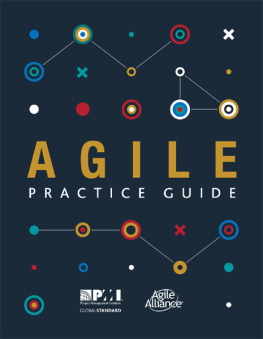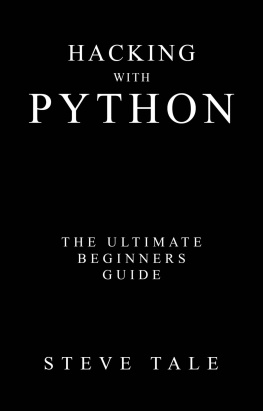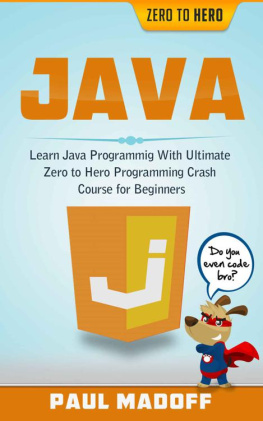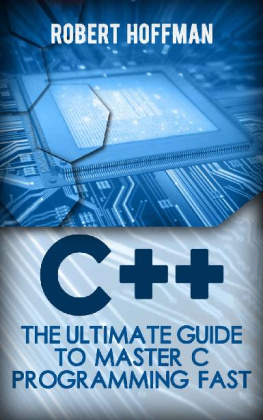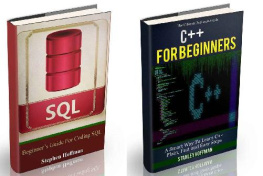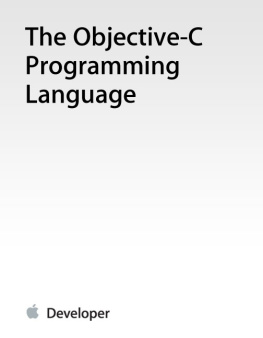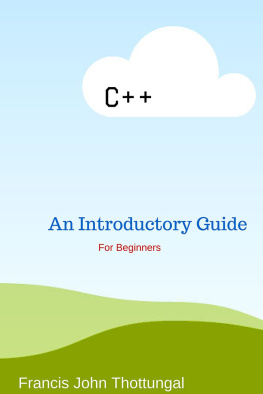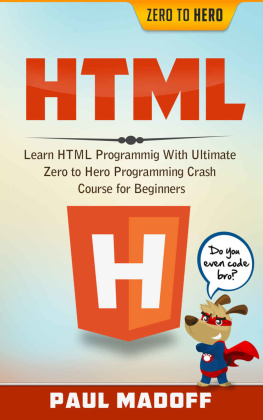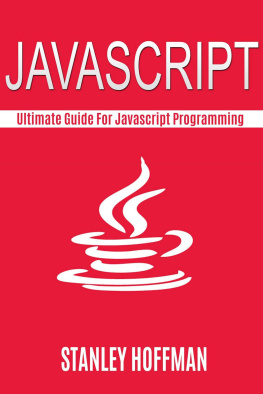coll. - C Programming Language. The Ultimate Beginners Guide
Here you can read online coll. - C Programming Language. The Ultimate Beginners Guide full text of the book (entire story) in english for free. Download pdf and epub, get meaning, cover and reviews about this ebook. year: 2016, publisher: Easy Programming, genre: Home and family. Description of the work, (preface) as well as reviews are available. Best literature library LitArk.com created for fans of good reading and offers a wide selection of genres:
Romance novel
Science fiction
Adventure
Detective
Science
History
Home and family
Prose
Art
Politics
Computer
Non-fiction
Religion
Business
Children
Humor
Choose a favorite category and find really read worthwhile books. Enjoy immersion in the world of imagination, feel the emotions of the characters or learn something new for yourself, make an fascinating discovery.
- Book:C Programming Language. The Ultimate Beginners Guide
- Author:
- Publisher:Easy Programming
- Genre:
- Year:2016
- Rating:5 / 5
- Favourites:Add to favourites
- Your mark:
- 100
- 1
- 2
- 3
- 4
- 5
C Programming Language. The Ultimate Beginners Guide: summary, description and annotation
We offer to read an annotation, description, summary or preface (depends on what the author of the book "C Programming Language. The Ultimate Beginners Guide" wrote himself). If you haven't found the necessary information about the book — write in the comments, we will try to find it.
C Programming Language. The Ultimate Beginners Guide — read online for free the complete book (whole text) full work
Below is the text of the book, divided by pages. System saving the place of the last page read, allows you to conveniently read the book "C Programming Language. The Ultimate Beginners Guide" online for free, without having to search again every time where you left off. Put a bookmark, and you can go to the page where you finished reading at any time.
Font size:
Interval:
Bookmark:
The C Programming Language The Ultimate Beginners Guide By: EasyProgramming Publisher Table of Contents
In this book, we're going to talk about what those elements are. We are also going to talk about what C is, where it came from, and all of the fundamental concepts that you have to understand before you actually start programming. In addition, we'll also teach you how to setup and use the Code Blocks IDE, which will help you greatly when programming in the C language. We hope you enjoy this book.
It is very likely that youre eager to get started with writing codes, and you may have already viewed a later chapter in this book. It is important to know a few key terms and programming concepts.
They attempted to reverse this trend by building a small, simple programming language on a minicomputer. What Dennis Ritchie wanted to maintain was not only an efficient computer programming language in which to create programs, but also a computer programming language around which programming community could formfellowship. They knew based from previous experiences that the real nature of joint computing as provided by time-shared, remote accessed systems is not just to enter computer code into a terminal, but to motivate post programming communication. The C programming language is a general purpose and structured programming language. It is also called a procedural oriented programming language. C is not specifically designed for specific application areas.
However, it was well suited for business and scientific applications. It has various features like control structures, looping statements, and micros required for applications. The C language has the following features:
- Portability
- Flexibility
- Effectiveness and Efficiency
- Reliability
- Interactivity
It is very old. In fact, over time the C programming language has been considered the Latin of programming languages. Unlike Latin, C is not dead. Lots of C programming still goes on despite of newer and fancier programming languages coming along. But like Latin, C is the foundation upon which many other programming languages are built. If you know C, you can more easily learn those other languages.
In a later chapter, we will talk about the programming languages syntax and other rules. But for now, know that the code you write is called a source code.
The source code is then compiled into object code. The program that creates the object code is called a compiler. The traditional name of the C language compiler is CC, which stands for C compiler. The compiler reads the source code file and generates an object code file. Object code files have a .o filename extension, and they use the same filename as the original source code file. The next step is called Linking.
It is often forgotten because modern compilers both compile and link, but linking is really a separate step. The linker takes the object code file and combines it with C language libraries. The libraries are the workhorse of the language. They contain routines and functions that control whatever device you are programming. If all goes well, the end result is a program file. You can then test run the program to make sure that it works the way you want it to.
And if not, you start the cycle all over again: edit, compile and link, or build, and test run. All of these toolsthe editor, compiler, linkerall originated at the command prompt or terminal. You can still find them there too. Programmers do a lot of coding at the command prompt because it is quick. More common, however, is to use an IDE, or Integrated Development Environment.
It also adds tools for debugging, creating complex programs, graphical tools and other features. Beneath it all, however, is the humble command line compiler and linker. The process is the same: edit, compile and link, run. You are going to do a lot of repeating and re-working before you get things right. The good news is that all the tools you need to begin your programming journey are found free on the internet. The bad news being that you have to find the right tools and install them properly.
This is not an issue for you here because in this book, well show you how it is done. You will see how to find a good IDE, or Integrated Development Environment, a C language compiler, and get everything setup and configured. You will find a horde of IDEs on the Internet. Microsoft offers the Visual Studio as its IDE, and Apple has Xcode. You are welcome to use those tools, especially if you are comfortable with them. But for this book, we have chosen the Code Blocks IDE.
The great thing about Code Blocks is that it comes with everything you need. Unlike other IDEs, you dont have to hunt for this or that after the IDE is installed. You only have to download, configures, and you are ready to go. Obtain Code Blocks by visiting the developers website: http://www.codeblocks.org . Point your favorite browserChrome, Firefox, Internet Explorerto that website. On that page, look for the download link.
Remember, the page you see below may look different, as web pages do change from time to time. 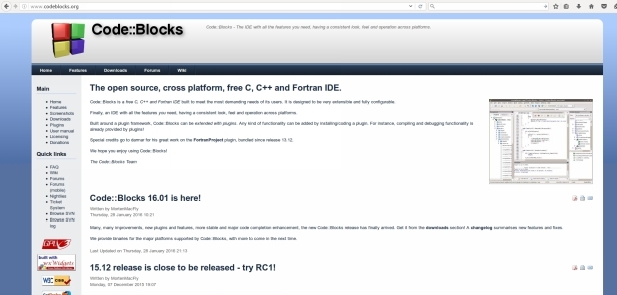 Click on the download link. Choose to download the binary release. On the next page, click the link that represents your computer operating system: Windows, Linux, or Mac OSX. For Windows, look for the setup.exe file that includes the MinGW compiler. For example, on the screen below, it says codeblocks-16.01mingw-setup.exe.
Click on the download link. Choose to download the binary release. On the next page, click the link that represents your computer operating system: Windows, Linux, or Mac OSX. For Windows, look for the setup.exe file that includes the MinGW compiler. For example, on the screen below, it says codeblocks-16.01mingw-setup.exe.
Font size:
Interval:
Bookmark:
Similar books «C Programming Language. The Ultimate Beginners Guide»
Look at similar books to C Programming Language. The Ultimate Beginners Guide. We have selected literature similar in name and meaning in the hope of providing readers with more options to find new, interesting, not yet read works.
Discussion, reviews of the book C Programming Language. The Ultimate Beginners Guide and just readers' own opinions. Leave your comments, write what you think about the work, its meaning or the main characters. Specify what exactly you liked and what you didn't like, and why you think so.

